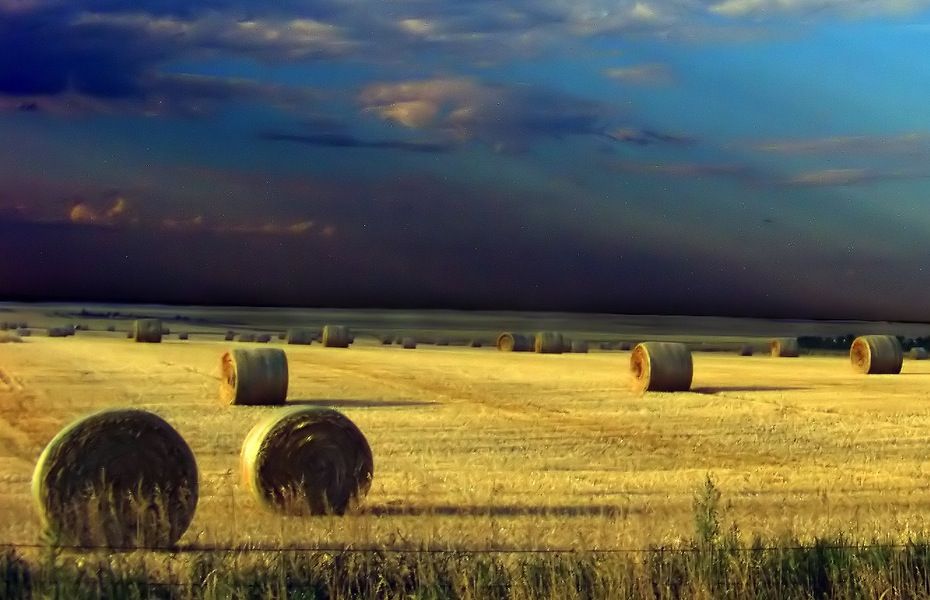Four climate skeptics review the climate data on the prairies, Canada, and globally.

This year has been terrible for farmers. A late spring seeding has been followed by a wet and cold fall. As much as 15 per cent of the crops were still in the fields over the Canadian prairies at the end of October. The losses could be in the billions.
We hear so much about “global warming” producing “climate change”, causing Canada to warm up excessively. What do the skeptics think?
The four people in the photo say they are skeptical that our added CO2 is producing either unusual warming or unusual cold. The climate data going back hundreds and thousands of years shows many climate cycles. Some are very long, nearly 1,000 years, some are 280 years, and some are 60 years. As a group, they find that the best explanation is that these cycles are solar driven. The big planets like Jupiter cause tidal effects on the sun, which possibly drives the changes in the number of sun spots. Solar scientists call the sun “active” when it has a higher number and “quiet” when it has a lower number of sun spots. Right now, the sun is extremely quiet, averaging five spots a month the past year versus the long-term average of 60. Historically, such low levels have coincided with colder climate cycles. In the 1980s and 1990s, the sun was very active, and that was a warming period. The odds are we are cycling into a cooling period, and Prairie farmers are going to be challenged with more years like the current one.
Who are the skeptics and what are their qualifications? Do they get paid? No, for decades they have studied climate science on their own. From the left: Ed Burgener, a retired mechanical engineer, Gerald Machnee, BSc., retired from Environment Canada, Dr. Madhav Khandekar, retired meteorologist from Environment Canada, Toronto, and Ray Garnett, MSc, semi-retired Agro-Climatologist formerly of the Canadian Wheat Board. Madhav and Ray are active researchers with dozens of published papers. Their most recent work is a paper showing a decline in the length of Canadian Prairie growing season in recent decades. Last year, Ed presented a one-and-a half-hour lecture at Creative Retirement Manitoba, called “A Skeptical View of Climate Science”.
What is that “skeptical view”? The skeptical view is that the climate data shows minimal warming due to our added CO2. The climate computer models erroneously project twice as much as really happens. That is an ongoing failure of climate science. The 1910 to 1940 warm burst is nearly identical to the 1978 to 2008 warming. The skeptical view notes that the extremes of hurricanes, tornadoes, droughts, excessive rain, extremes of cold and hot, were often worse back then. For many years, it was thought that the “dirty thirties” were just a North America event, but the data now shows that it was worldwide. This “natural” event undermines the uniqueness of our current warming event, suggesting natural cycles as causal, not our added CO2. The skeptical view also includes the observation that the world is “greening up” due to our added CO2. Green house operators have known for over 100 years that adding CO2 increases plant growth. NASA measured that extra plant and tree growth at about 14 per cent, world-wide. The South Sahara is greening the most, since plants need less water for photosynthesis with higher CO2 levels. Some crop yields are said to be increased by 25 per cent due to the extra CO2 alone. Clearly, the data suggests that our added CO2 is beneficial for humanity and all life on earth.
What can one predict for the future? It is likely that a renewed cool period will bring big challenges for farmers. It is likely that a quiet sun will lead to increased meridional or north-south flow of the jet stream with it, dropping deeper into North America, leading to regional bouts of hot and dry, wet, and unfortunately some of those annoying cold snaps during the winter.
What about the need to reduce our fossil fuel use, which produces the extra CO2? The data does not indicate that to be a necessity. The climate has not become more “extreme” due to our CO2, despite what gets said in the media. The use of fossil fuels is net beneficial because of increased food production and a greener earth, such as the South Sahara. It should be noted that people do reduce fossil fuel use on their own, which is encouraging. For example, when given the choice between vehicles, the vehicle with better fuel mileage typically gets bought.
Yes, we four are skeptical about all the gloom and doom we hear about man made “climate change” due to our added CO2. We are also alert to the growing body of data showing that the sun’s tiny variations get amplified and result in climate changes. History over 3,000 years shows cold climate cycles to be disastrous to civilizations all over the earth, and warm times prosperous. As a result, we favour warmer times for the Canadian prairies and Canada.

